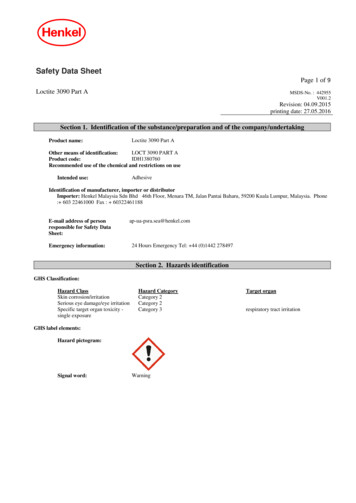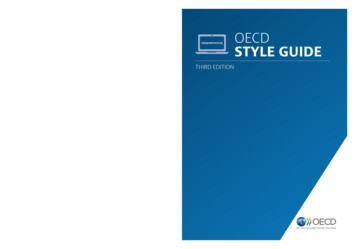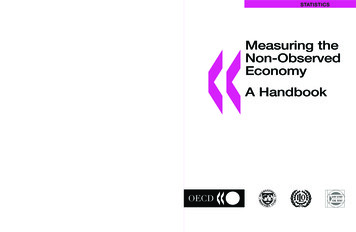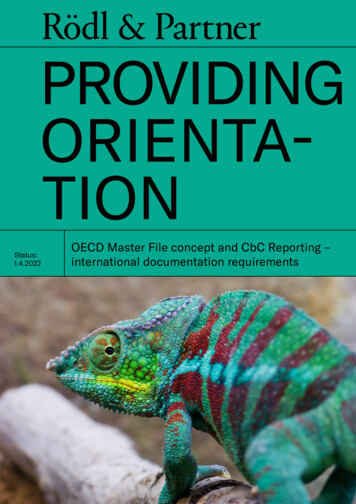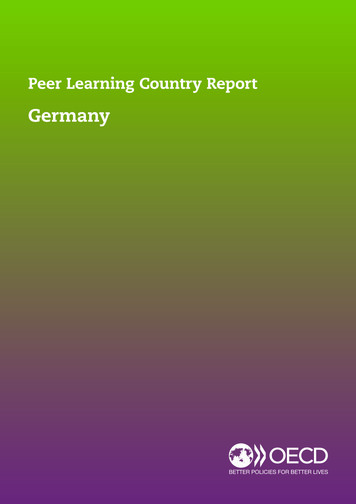
Transcription
Peer Learning Country ReportGermany
Germany sees private sector engagement as an important way to leverage the strengthsand potential of the private sector to realise development outcomes. Its objectives for privatesector engagement include the mobilisation of private capital and expertise, improvedefficiency in public service delivery in partner countries, promotion of voluntary privatesector commitments that supplement government regulations, improved developmentoutcomes with private contributions, and supporting German and other companies –especially small and medium-sized enterprises – in developing markets. This reportoutlines lessons arising from Germany’s approach to private sector engagement. Germanyharnesses the power of its economy, notably the “Mittelstand”, and draws on its successfulapprenticeship model to assist in the development of effective vocational education andtraining programmes that meet the needs of the private sector in partner countries. It alsouses a wide range of mechanisms to engage the private sector and promotes innovation,coherence and synergies within its portfolio for private sector engagement. Germany’sexperience offers lessons on how to effectively promote opportunities for engagementwith the private sector, establish multi-stakeholder partnerships and monitor private sectorengagements at the project and portfolio levels.2PRIVATE SECTOR PEER LEARNING COUNTRY REPORT: GERMANY OECD 2016
INTRODUCTIONOn 22-26 February 2016, representatives from Luxembourg, the Netherlands and Korea participated in a mission toGermany as part of the Organisation for Economic Co-operation and Development’s (OECD) Development AssistanceCommittee (DAC) peer learning exercise on working with and through the private sector in development co-operation.Supported by the OECD-DAC Secretariat, the mission included discussions with a range of government actors,implementing partners and representatives from the private sector and civil society. Discussions touched on all aspectsof the analytical framework for the peer learning exercise, including policies, institutional make-up, human resources,government co-ordination, operational frameworks and key insights related to the management of private sectorengagement mechanisms and specific partnerships. Cross-cutting issues such as ensuring additionality, results, andmonitoring and evaluation were prominent themes covered during the week.This report provides an overview Germany’s approach to private sector engagement and key lessons learned. It alsoincludes a list of key resources.THE GERMAN APPROACH TO PRIVATE SECTOR ENGAGEMENTWith its private sector engagement, the German government’s development co-operation aims to ensure sustainableeconomic development in partner countries. As illustrated in Figure 1, sustainable economic development consists offour core areas: private sector development, vocational education and training, and financial systems development, all ofwhich are underpinned by Germany’s focus on economic policy. Across these core areas, Germany engages the privatesector. German development policy is guided by social and ecological market economy principles and directed to supportpro-poor, inclusive and environmentally sustainable growth.Figure 1. Engagement with the private sector in the context of sustainable economic developmentSustainable economic developmentPrivate sectordevelopmentVocationaleducation andtrainingFinancial systemsdevelopmentEconomic policyEngagement with the private sectorGermany sees private sector engagement as an important way to leverage the strengths and potential of the privatesector to realise development outcomes. Specifically, such engagement puts additional (private) funds and know-howat developing countries’ disposal and creates shared value for people in partner countries, private sector partners andGerman development co-operation efforts. In turn, the efficiency of development co-operation increases and dialoguebetween government institutions and the private sector leads to benefits for both sides.Germany’s objectives for private sector engagement include the mobilisation of private capital and expertise, improvedefficiency in public service delivery in partner countries, promotion of voluntary private sector commitments thatsupplement government regulations, improved development outcomes with private contributions, and supporting Germanand other companies – especially small and medium-sized enterprises (SMEs) – in developing markets (BMZ, 2011).Germany’s approach harnesses the power of its economy, notably the “Mittelstand”, which refers to Germany’s highlycompetitive and specialised SMEs. Germany draws on its successful apprenticeship model to assist in the developmentof effective vocational education and training programmes that meet the needs of the private sector in partner countries.3PRIVATE SECTOR PEER LEARNING COUNTRY REPORT: GERMANY OECD 2016
Key actors and institutionsGermany’s Federal Ministry for Economic Cooperation and Development (BMZ) sets overall policy objectives and developslong-term strategies. It also manages a focal point for the private sector that provides advice on the opportunitiesavailable for partnership. BMZ has five divisions that participate in private sector engagement activities, and cover thefollowing areas:1. economic policy (including financial sector development);2. trade-related development co-operation;3. sustainability standards;4. employment creation; and5. financing for development.These divisions encompass efforts related to private sector development in partner countries as well as engagementswith German and European private sector actors in development co-operation.Engagement with private sector actors in partner countries is carried out by three implementing partners. The DeutscheGesellschaft für Internationale Zusammenarbeit (GIZ) was formed in January 2011 when three implementing organisationsfor technical co-operation merged – the German Technical Cooperation (GTZ), German Development Service (DED) andCapacity Building International, Germany (InWEnt). It is an implementing partner for BMZ’s private sector engagement,operating on behalf of BMZ as an international enterprise for human resources development, training and dialogue.Programmes implemented by the GIZ include the develoPPP.de programme, EZ-Scouts and integrated developmentpartnerships.The German Investment and Development Corporation (DEG) was founded in 1962 and became a part of KfW Groupin 2001. KfW Development Bank, one of the banking group’s business units, is responsible for financial co-operation,which is the largest form of development co-operation in Germany. It does not implement technical co-operationprojects, though financial co-operation programmes are co-ordinated with German technical co-operation and otherdonor interventions. While KfW Development Bank supports programmes and projects that mainly involve governmentinstitutions in developing countries and emerging economies, the DEG promotes private business initiatives in developingand transition countries, provides long-term capital, advice, consultancy services and partnership-based support, and isalso one of the implementing partners for the develoPPP.de programme.sequa gGmbH is an international development organisation that has been supporting German chambers of commerce,business associations and companies for over 25 years by providing assistance in the acquisition and implementation ofinternational co-operation projects. sequa’s main shareholders are the Association of German Chambers of Industry andCommerce (DIHK), German Confederation of Skilled Crafts (ZDH), Federation of German Industries (BDI), Confederationof German Employers’ Associations (BDA) and GIZ. For BMZ, sequa is the implementing agency of several programmes,including the Chambers and Associations Partnership Programme, Vocational Education and Training PartnershipProgramme and develoPPP.de programme.Other German institutions also engage the private sector. Launched in April 2016, the Agency for Business and EconomicDevelopment acts as an entry point for businesses seeking to partner with the German government in developmentco-operation and is responsible for proactively engaging with the German private sector. The Federal Institute forGeosciences and Natural Resources (BGR) specialises in technological and scientific matters. Germany Trade & Invest,which operates under the Federal Ministry for Economic Affairs and Energy (BMWi) and serves as Germany’s economicdevelopment agency, supports German companies setting up in foreign countries, promotes Germany as a businesslocation and assists foreign companies setting up in Germany. Support is also available through the Import PromotionDesk to connect German importers with SMEs in developing countries and emerging economies. Finally, the FederalMinistry for the Environment, Nature Conservation, Building and Nuclear Safety (BMUB) manages Germany’s emissionstrading scheme and has made available approximately EUR 400 million since 2008 for the International Climate Initiative,1which funds climate and biodiversity projects through an ideas competition that is open to businesses and implementingpartners such as civil society organisations and research institutions.4PRIVATE SECTOR PEER LEARNING COUNTRY REPORT: GERMANY OECD 2016
Mechanisms for private sector engagementGermany uses a wide range of mechanisms to leverage private investment for sustainable economic developmentincluding grants, concessional loans, credit lines to local financial institutions, blended finance packages, public-privatepartnership arrangements, structured investment funds, risk capital provision, equity capital, mezzanine finance andguarantees. The key mechanisms used by Germany are listed below. They include development partnerships with theprivate sector, bilateral agreements, work with chambers and business associations, corporate social responsibilitypromotion, the promotion of inclusive business, activities to fight corruption, the provision of expertise, and the provisionof finance. Development partnerships are central to German development co-operation. Since 1999, more than 1 700partnerships with the private sector have been formed. The develoPPP.de programme is Germany’s primary mechanismfor their establishment. Development partnerships include smaller partnerships with individual companies as well asstrategic development alliances that bring together two or more private partners.2Development partnerships and strategic development partnerships 3 Financing mechanism based on idea competitions for development partnerships four times per year. Development partnerships employ a 50% cost-sharing formula (EUR 200 000 maximum public contribution) forprojects in countries that are eligible for official development assistance. Development partnerships are implemented by GIZ, DEG and sequa, each of which contribute according to theirexpertise and partner needs. Strategic development partnerships are implemented by GIZ and DEG and must have a particularly pronounceddevelopmental benefit. The total project budget must be at least EUR 750 000. Proposals must meet specific selection criteria. Applicants can be German or European companies.Development partnerships through bilateral agreements and specific programmes Integrated development partnerships involve projects between multinational, regional or local companies and theGerman government through bilateral and regional co-operation programmes in a partner country that directly helpachieve programme objectives. GIZ serves as the contact point for interested companies. Scope for partnership depends on the agreement enteredinto by the German government and partner countries.Chamber and business association support services sequa and the Savings Banks Foundation for International Cooperation are key implementing partners for thismechanism. They both support the establishment of business membership organisations in partner countries (seeKVP and BBP mechanism profiles). sequa assists German chambers in engaging in international partnerships.Advisory services, learning and implementation networks for inclusive business, and corporate social responsibility The Senior Expert Service places retired development professionals in partner countries, where they give adviceon professional matters, mainly to SMEs. Learning and implementation networks for inclusive business include a range of activities such as the InclusiveBusiness Action Network, an entry point for and to the global inclusive business community (see partnershipprofile). Responsible and Inclusive Business Hubs complement the global Inclusive Business Action Network.Hubs in the Middle East and North Africa, the Southern African Development Community and Southeast Asiaprovide technical support to develop and implement projects, skills and business model development, advice oninclusive business models, knowledge sharing and partnership facilitation between businesses and developmentco-operation actors. Founded by BMZ and leading German industrial organisations, the Alliance for Integrity is a business-driven,multi-stakeholder initiative that assists businesses through training and knowledge sharing to improve theirorganisational structures and eliminate red tape, thus reducing corruption-related hazards (see partnership profile). Germany also supports relevant national and international processes on corporate social responsibility, such asthe United Nations Guiding Principles on Business and Human Rights, United Nations Global Compact and Groupof Seven initiative on sustainable supply chains.5PRIVATE SECTOR PEER LEARNING COUNTRY REPORT: GERMANY OECD 2016
Promotion of sustainable business activities GIZ works with companies to build frameworks for action on sustainable development (e.g. through the GlobalCompact Network Germany and the lab of tomorrow). BMZ also provides support through its implementing organisations for efforts to raise consumer awareness aboutproduction conditions and social situations in companies, support for fair trade and commitment to establishingdecent labour conditions.Expertise GIZ provides training, prepares staff for assignments abroad and assists in recruiting internationally qualifiedpersonnel. The EZ-Scouts programme dispatches over 20 expert to chambers of commerce and business associations toadvise German companies on business opportunities with developing and emerging countries and the promotionactivities of BMZ (see also mechanism profile). The Centre for International Migration and Development’s ExperTS Programme (formally known as the IntegratedExperts Programme) places highly qualified experts with organisations in developing countries. German companiescan benefit from the professional experience and local knowledge of approximately 25 integrated experts workingat German chambers of commerce abroad.Finance – DEG Investment opportunities are untied and provided on a long-term basis of four to ten years. Provides loans, equity capital, mezzanine finance, guarantees, grants (through the develoPPP.de programmeand Climate Partnerships with the Private Sector which is funded by BMUB) and repayable grants (through theUp-Scaling Programme for early-stage SMEs). Criteria for obtaining finance vary by mechanism and type of investor. Supports feasibility studies and business support services (50% of costs up to EUR 200 000), promotes dialogueacross regions among companies that operate in the same sector, and provides advisory services.Allocations 4In 2016, the private sector engagement portfolio had a budget in excess of EUR 124 million. Figure 2 provides an overviewof allocations by programme and institution. BMZ estimates that over 2003-2014, EUR 7.79 billion was contributed toprivate sector engagement, including EUR 1.95 billion for private sector development. For 2016, EUR 124.8 million hasbeen allocated to engagement with the private sector. Furthermore, BMZ estimates that – through the develoPPP.deprogramme – over 1999-2015, EUR 330 million was contributed to partnerships with the private sector, matched byEUR 558 million in private contributions. Over 1999-2012, Asia was the largest recipient of develoPPP.de partnerships andfunds (EUR 274 million), followed by Africa (EUR 177 million) and Latin America (EUR 131 million). Countries in EasternEurope and the Middle East and North Africa also benefited from partnerships.Germany has no specific sectoral focus for private sector engagement, though special emphasis is placed on theagricultural sector for food security. When selecting sectors, the potential of a sector to generate jobs and raise incomesfor poor segments of a population over the medium term are decisive factors. Through the develoPPP.de programme,the bulk of development partnerships over 1999-2015 were related to economic reforms (614 partnerships totallingEUR 330 million), followed by the environment (273 partnerships totalling EUR 132 million) and agriculture (230partnerships totalling EUR 131 million). Other sectors that have benefited from partnerships include health, water, energy,education, and transportation and communications.DEG’s portfolio as of 2014 was EUR 8 billion, with EUR 2.3 billion in equity. Asia is the largest recipient of DEG investments(EUR 2.6 billion), followed by Latin America (EUR 2.1 billion), Africa (EUR 2 billion) and Europe (EUR 1.1 billion). DEGprimarily invests in services, agribusiness and the food industry, manufacturing, the financial sector and infrastructure.The financial sector received the largest amount of new commitments in 2015 (39%, EUR 413 million), followed bymanufacturing (25%, EUR 294 million) and infrastructure (24%, EUR 255 million).6PRIVATE SECTOR PEER LEARNING COUNTRY REPORT: GERMANY OECD 2016
Figure 2. Private sector engagement portfolio: Planned budget allocations for 2016develoPPP.de: 30%, EUR 37.5 millionSavings Banks Foundation forInternational Cooperation: 11.5%,EUR 14.4 millionChambers and AssociationsPartnership Programme: 6.5%,EUR 8.1 millionVocational Education and TrainingPartnership Programme: 7%,EUR 8.7 millionSenior Expert Service: 9%, EUR 9 millionPrivate sectorengagement portfolio –EUR 124.8 millionEZ-Scouts: 3%, EUR 3.6 millionExperTS: 3%, EUR 3.5 millionGerman Academic Exchange Service:3%, EUR 3.5 millionAgency for Business and EconomicDevelopment: 1.5%, EUR 1.9 millionOther: 27%, EUR 34 millionLESSONSBuilding blocks for private sector engagementPolitics and Policiesuu Ground policies and approaches to private sector engagement in comparative advantages.The German approach to private sector engagement is grounded in the strengths of the German economy – SMEs, thevocational education and training system and well-developed business membership organisations (i.e. chambers ofcommerce and business associations). In addition to harnessing the skills, knowledge and finance of German SMEs, theGerman government draws on its extensive experience in successful vocational education and training programmes.It works with business membership organisations to support similar organisations, develop vocational education andtraining programmes and promote investment opportunities in developing countries. DAC members should incorporatetheir economic comparative advantages into policies and approaches to private sector engagement.uu Link private sector engagement activities in development co-operation to broader policy objectives.Linking private sector engagement activities explicitly to policies in foreign, development, economic, environmentaland energy arenas facilitates policy coherence and has the potential to ensure that programmes and initiatives meetmultiple policy objectives, such as the internationalisation of domestic companies, investment promotion and sustainableeconomic development.7PRIVATE SECTOR PEER LEARNING COUNTRY REPORT: GERMANY OECD 2016
Institutionsuu Harness the comparative advantages of implementing partners when developing new private sectorengagement activities.It is crucial to consider and make use of the comparative advantages of implementing partners when allocating funds,implementing co-operation activities and liaising with stakeholders. The German government’s development co-operationinvolves a range of actors that offer different expertise and skill sets in the context of private sector engagement. Forexample, DEG is responsible for various financing instruments, GIZ carries out technical co-operation activities, andsequa is well-connected to chambers of commerce and business associations and has significant expertise in vocationaleducation and training.uu Inclusion of divisions responsible for private sector engagement in the establishment of sectoral, bilateraland regional development co-operation plans offers opportunities for greater private sector engagementacross development portfolios.Strategic planning processes do not always include inputs from divisions responsible for private sector engagement.Opening up these processes to such divisions has the potential to increase strategic private sector engagement acrossgovernment institutions.Co-ordinationuu Co-ordination within and between government institutions is not automatic and therefore must befacilitated.Formal and informal structures offer opportunities for continuous learning, knowledge exchange and synergies.The use of shared data management and knowledge sharing platforms for private sector engagement can promotesynergies within and between government institutions. In Germany, co-ordination on monitoring and evaluation betweenimplementing partners is an example of good practice.Division of labour is an important component of co-ordination. In the German context, a range of ministries and agencieshave varied responsibilities with regard to private sector engagement. For example, EZ-Scouts dispatched to businessmembership organisations advise German companies on business opportunities and challenges in developing andemerging countries. By contrast, Germany Trade & Invest provides trade and procurement information for companies andpromotes inward investment.uu International co-ordination between DAC members, including their development finance institutions, isimportant for harmonising efforts vis-à-vis private sector engagement and furthering discussion on bestpractices.The mission to Germany highlighted the importance of efforts by European development finance institutions to createa set of harmonised results indicators. The use of such indicators enables these institutions to analyse the impactsof projects more efficiently and consistently, enhances opportunities for sharing best practices and lessons learned,and simplifies reporting requirements for private sector partners that may engage with multiple development financeinstitutions. There are other opportunities for discussion about difficult issues related to private sector engagementin development among development finance institutions, with other development actors, and at the OECD and DonorCommittee for Enterprise Development.Focus and delivery of private sector engagement strategiesCountries and sectorsuu As a priority area in bilateral programmes, sustainable economic development is an important entry pointfor private sector engagement.Private sector engagement can promote solutions to challenges across sectors such as health, education, and peace andsecurity. However, as a priority area in bilateral programming, sustainable economic development is a key entry point forprivate sector engagement activities.8PRIVATE SECTOR PEER LEARNING COUNTRY REPORT: GERMANY OECD 2016
uu Opportunities exist to harness private sector engagement activities in relation to migration.Germany recently launched an employment training programme for refugees in Germany and Turkey. The programmeaims to equip them with the necessary skills to support reconstruction efforts in their countries of origin. In order toprovide both refugees and locals in Turkey with a better future, Germany also launched an employment drive called“Partnership for Prospects”. Its purpose is to create up to 500 000 jobs for refugees and locals in the region by 2017,while simultaneously supporting the construction of schools, hospitals and community centres through cash-for-workprogrammes. Potential exists to harness greater support for such initiatives across DAC members.Partnersuu Government institutions offer significant value beyond financing to private sector partners.The role of government as a facilitator in bringing together partners (and competitors) is important, in addition to the role ofproviding financial resources. Dialogue helps build confidence among competitors on difficult issues, such as corruption.Moreover, companies benefit from branding when partnering with government stakeholders. Formal partnershipsdemonstrate to others that government stakeholders have confidence in private sector partners, which can benefitcompanies when engaging with local and other development partners. In addition to public-private dialogue, governmentalso has a role to play in facilitating dialogue across sectors, including with academia and civil society.uu Establish clear entry points for private sector actors to learn about engagement opportunities indevelopment co-operation and actively promote opportunities.Germany established a private sector focal point (now replaced by the Agency for Business and Economic Development)to provide information and advice to companies seeking to partner with the German government in developmentco-operation. A lesson learned in this regard is that it is important to be clear on the role of the entry point in externalcommunications to ensure that partners understand the services offered. Moreover, potential exists to harness theknowledge of private sector contact points in terms of feedback on existing instruments.In addition to providing an entry point for potential partners, it is important to actively promote private sector engagementopportunities. Dispatching experts to chambers of commerce and business associations through the EZ-Scoutsprogramme, for example, is an important means to increase private sector engagement. Other tools such as policydialogue are also helpful.uu Differentiate approaches to engaging different types of private sector partners.There is a need to differentiate approaches to engaging different types of private sector actors. For instance, the needsof German and European companies are different than those of companies domiciled in partner countries. Ensuring thatengagement tools are suitably flexible to accommodate various needs is important to enabling partnerships with a widerange of actors. Smaller companies and start-up entrepreneurs typically require specialised instruments to enable theirengagement.uu Chambers of commerce and business associations are important partners in private sector engagements.Chambers of commerce and business associations convene businesses, provide government institutions with access tomembers and can play an active role in supporting similar organisations in developing countries. The German approachincludes a number of programmes aimed at engaging business organisations.uu Language matters for attracting the right partners.Speaking the language of the private sector is critical for attracting partners. For example, rather than referring tolog-frames and results-based frameworks, German implementing partners find it more effective to speak in terms ofmilestones when discussing what progress looks like in partnerships.uu Understand the people behind the company and their motivations.Though a company may meet formal requirements for partnership, it is essential to understand the people behind acompany and their motivations. For example, personal connections between an individual and a partner country canpositively motivate a partnership.9PRIVATE SECTOR PEER LEARNING COUNTRY REPORT: GERMANY OECD 2016
uu Civil society organisations play an important role in supporting private sector engagements.Civil society organisations bring value to private sector engagements as representatives of specific communities or issueareas, watchdogs, experts and implementing partners. Their varied roles should be respected and efforts in terms ofpolicy dialogue and funding should be made by government institutions to enable their engagement in addressing complexchallenges alongside the private sector and government. Though private sector actors and civil society organisations arealready co-operating in development, the provision of dedicated funds for multi-stakeholder partnerships has potentialto further facilitate their co-operation.Tools for private sector engagement in development co-operationSuite of toolsuu Link private sector engagement mechanisms to business-enabling environment initiatives.A multi-layered approach to private sector engagement that includes addressing enabling environment conditions, marketaccess and skills development creates opportunities to bring private sector solutions to a range of issues and makeconnections between activities. Implementing partners’ openness to working with companies on business-enablingenvironment initiatives and accessibility are appreciated by private sector partners in Germany.uu Establish private sector engagement mechanisms to complement existing private sector support mechanismsoffered by government and fill gaps.When establishing new private sector engagement mechanisms, attention should be paid to the existing suite of toolsoffered by government institutions outside development co-operation. As private sector engagement mechanisms evolve,it is also important to review and address gaps between available mechanisms. For example, specialised tools may beneeded to target the smallest compani
German government through bilateral and regional co-operation programmes in a partner country that directly help achieve programme objectives. GIZ serves as the contact point for interested companies. Scope for partnership depends on the agreement entered into by the German government and partner countries.





